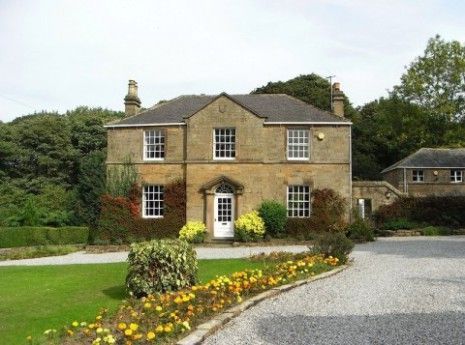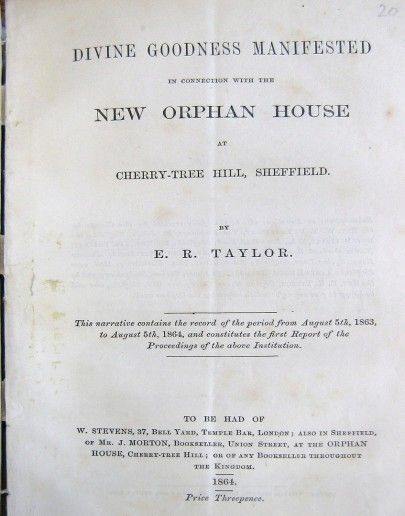Edward Ridge Taylor - the founder of Cherrytree Orphanage

Cherrytree Orphange, Mickley Lane, Totley in c 1900
Edward Taylor returned to Sheffield from Barrackpore, India in 1862 with his wife, Marian and their new born daughter, Arabella. We know he was born in Sheffield in 1824, but know nothing about his parents or childhood. From his own writings we have learnt a little about his life before he came back to Sheffield. He travelled extensively throughout the Crimea (where he set up a religious reading and rest station for British soldiers), and was in Egypt, Constantinople and the East Indies.
On the voyage home from India he decided to set up an orphanage and by August 1862 he had rented a house at the bottom of Osborne Road, Nether Edge and opened the Cherry-Tree Orphanage.
The annual reports he wrote for the orphanage were published in the local press. They read more like religious tracts than reports and give us a picture of a man guided in everything he did by his belief in God. He threw himself, his family and the orphans into the care of the Lord whom he trusted would provide for them. And so it was! Funds flowed in from all over the country; local people donated sacks of potatoes, coal and firewood. The orphanage flourished and by its fourth year there were thirty five children being cared for there.
In 1865 their landlord gave them notice to quit from the house on Osborne Road and so the orphanage was moved to Highfield, at the bottom of Sharrow Lane. The expense and instability of renting houses prompted Edward Taylor to find a permanent home for the orphanage. He launched an appeal for money to buy land for a purpose built orphanage. His appeal started an acrimonious correspondence in the press in which he was accused of being unfit to manage the orphanage finances and of not being qualified to use the title "reverend". Lots of people came to his defence and by 1867 enough money had been collected to buy Brook House and surrounding land on Mickley Lane and building work was started.

Brook Hall, Mickley Lane, Totley was home to the orphans whilst the new orphanage was being built on adjacent land.

The Cherrytree Orphanage building is now a Leonard Cheshire Home
In August 1869 Edward Taylor resigned from Cherrytree and he and his family left Sheffield. The orphanage was well established by this time with its own board of trustees and a new building. Perhaps he felt that his work here was done. This seems to be borne out by the entry in the 1871 census which finds him and his family (now with four children) at Ardwick in Manchester running another orphanage.
Ardwick was the poverty stricken area of Manchester in which Marx and Engels studied the lives of working people and were inspired to write The Communist Manifesto.
By 1881 the family had moved to Cardiff, but had no orphans living with them and Edward Taylor was describing himself as retired. He died in Cardiff at 12, Gold Street, Roath, in February 1889. He was 63 years old and his death certificate tells us he had had senile decay for 3 months prior to his death. He left £52 to his wife, Marian.
We lose track of the family after Edward's death until 1901, when we find Marian living on Deville Road, Worthing with her daughter, Arabella and her two grandchildren, both born in Calcutta. The family were still living in Worthing in 1911, near the sea front at The Styne; an area now populated with good hotels in large, converted Victorian buildings. The household comprised ten women and one man; family members, wards and boarders, all either living on their own means or working as servants to the household.
The glimps of lives that the census records offer us invite more opportunities to speculate than hard facts about a family. What is undisputed though is that throughout his life and after his death, Edward Taylor's family opened their home to people in need of care and a place to live.
Divine Goodness Manifested etc.

Divine Goodness Manifested etc.
by Edward Ridge Taylor, 1864
page 5 is missing
Divine Goodness Manifested etc.pdf
Adobe Acrobat document [4.0 MB]
